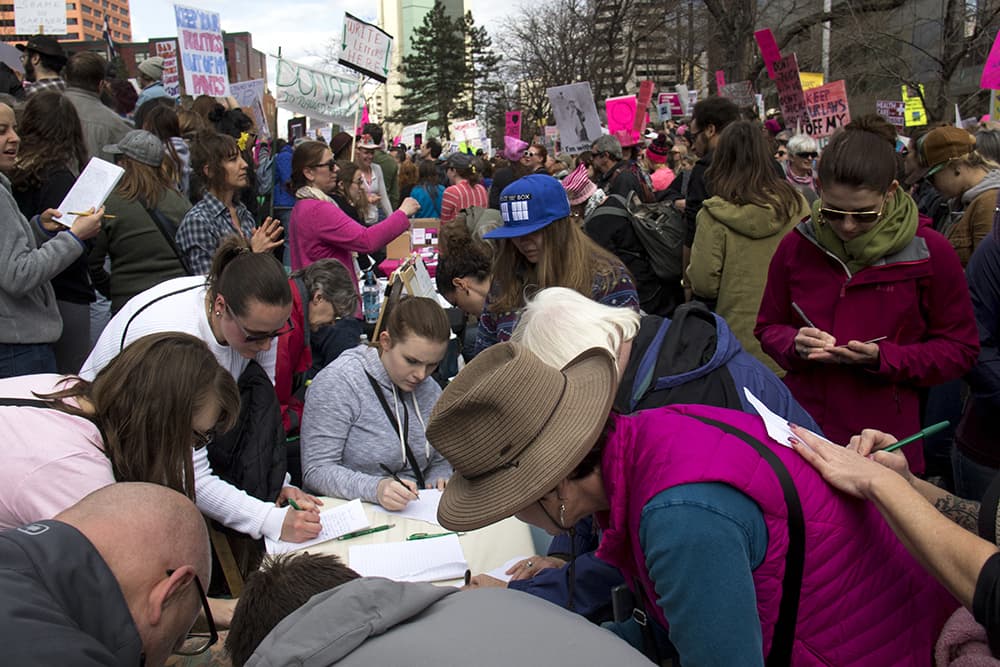
David Flaherty of the Republican-leaning polling firm Magellan Strategies sees trouble brewing for Republicans in 2018 in the firm's first statewide poll of likely voters, but it's way too soon to tell if that trouble will reach U.S. Sen. Cory Gardner.
Based on who showed up to vote in 2010 and 2014, this survey skews Republican, so President Donald Trump has a higher approval rating than we've seen in a lot of national polls. It's still below 50 percent, and Republicans in Congress score even lower.
Among likely 2018 voters, Magellan found that 47 percent approve and 49 percent disapprove of the job Trump is doing as president, while 34 percent approve of the job the Republicans in Congress are doing and 58 percent disapprove.
These findings are based on a telephone survey of 502 likely voters taken on April 26 and 27. The survey is weighted to assume 37 percent of voters are registered Republicans, 33 percent are Democrats and 30 percent are unaffiliated.
Things look worse for Republicans among unaffiliated voters: 40 percent approve of the job the president is doing and 53 percent disapprove. And when it comes to Congress, only 29 percent of unaffiliated voters approve of the job Republicans are doing and 59 percent disapprove.
A generic Democrat on a Congressional ballot does five points better than a generic Republican in this poll, even though the voters skew Republican.
"Some political observers may not be surprised with these results, considering Hillary Clinton and Sen. Michael Bennett carried Colorado relatively easily in 2016," Flaherty wrote in a summary of the poll results. "However, considering this survey is weighted to a mid-term electorate turnout where Republicans are projected to contribute 37 percent of the vote, Democrats 33 percent and unaffiliated voters 30 percent, this is relevant to 2018."
Because most Republicans will always vote Republican and most Democrats will always vote Democratic, unaffiliated voters are the key to Colorado elections.
"That's the key to our governor's race. That's the key to the state House and Senate. The unaffiliated voter holds the keys to the kingdom in Colorado, and the Republicans are not off to a good start with those voters," Flaherty said.
A lot could change between now and November 2018, Flaherty noted.
"This movie is only still in its first 10 minutes," he said. "What are Republicans actually going to do? Are they going to get around to an infrastructure deal? Are they going to repeal healthcare? What is that going to look like?"
But Democrats have a lot of intensity, and they're united, Flaherty said. For one thing, they were very eager to participate in this poll. Flaherty said he's not prepared to assume they'll actually show up in higher numbers than Republicans, who traditionally are more likely to vote in mid-terms, but there's a good chance they'll do better than 2014.
"As a Republican-leaning polling firm here, you can see the seeds of a Democratic wave in the making," he said. "And a lot of that is the unaffiliated voters are not liking what they're seeing."
What does this mean for Gardner, who isn't up for election until 2020?
Among all respondents, 40 percent approve of the job of the job Gardner is doing, while 37 percent disapprove and 23 percent do not have an opinion.
Democrats on Twitter are crowing about Gardner's low approval rating.
The NRSC is the National Republican Senatorial Committee, the organization working to maintain the Republican majority in the Senate. Gardner is the chairman, and he was tapped in part because he defeated an incumbent Democrat in a swing state where Republicans struggle to win statewide races. That is, he's got the stuff, whatever that is.

Silverii, who heads the liberal group ProgressNow Colorado, also highlighted the fact that Republican voters like Trump more than they like Gardner. Magellan's poll found that 59 percent approve of Gardner, while 85 percent approve of the president. Gardner is walking a delicate line: He faces intense protests from Democrats for even conventional Republican and conservative positions, but he's been more critical of the president than some Republicans would like. Earlier this year, Robert Loevy, professor emeritus of political science at Colorado College noted that Gardner has to be concerned about a Republican primary electorate before he worries about the general electorate in 2020.
Flaherty said these results are really in the eye of the beholder. In years of polling around the country, it's pretty normal for a freshman senator to have roughly equal approval and disapproval ratings, which Gardner does. So yes, he's under 50 percent, but lots of voters simply don't have an opinion. Given that there's been months of protests against him, that's not so bad, Flaherty said.
And it's simply too early, Flaherty said, to tell if Gardner's positions on Trump and Russia or Trump and health care or Trump and public lands are hurting or helping him. There's no real baseline to compare these results.
"There's good news for Cory," Flaherty said. "He's not underwater, given all the hits he's taken and the protesting since the election. Depending on how you feel, you can take these results either way. You can say, 'He's below 50, he's in trouble.' Every time I do a survey of a freshman senator, they're below 50 percent. Nobody has any idea if they're doing a good job."
This story has been updated throughout.










